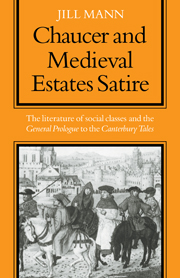Book contents
- Frontmatter
- Contents
- Preface
- List of Abbreviations
- Note on References
- 1 Introduction
- 2 The Anti-Clerical Tradition in Estates Satire
- 3 Estates Ideals
- 4 The Omission of the Victim
- 5 Independent Traditions: Chivalry and Anti-Feminism
- 6 Descriptive Traditions: Beauty and the Beast
- 7 ‘Scientific’ Portraits
- 8 New Creations
- Excursus: The ‘General Prologue’ and the ‘Descriptio’ Tradition
- 9 Conclusions
- Appendices
- Notes
- Selected Bibliography and List of Works Cited
- Index
5 - Independent Traditions: Chivalry and Anti-Feminism
Published online by Cambridge University Press: 23 October 2009
- Frontmatter
- Contents
- Preface
- List of Abbreviations
- Note on References
- 1 Introduction
- 2 The Anti-Clerical Tradition in Estates Satire
- 3 Estates Ideals
- 4 The Omission of the Victim
- 5 Independent Traditions: Chivalry and Anti-Feminism
- 6 Descriptive Traditions: Beauty and the Beast
- 7 ‘Scientific’ Portraits
- 8 New Creations
- Excursus: The ‘General Prologue’ and the ‘Descriptio’ Tradition
- 9 Conclusions
- Appendices
- Notes
- Selected Bibliography and List of Works Cited
- Index
Summary
Estates satire is no more of a watertight compartment than any other literary genre. Although the enumerative estates form may be abandoned, the traditional satire on social classes is recognisable in such forms as fabliau or the drama, and it is exactly this pervasiveness which justifies the use of heterogeneous sources for evidence of estates stereo-types. The influence is not, however, one-way; something of the original contribution of independent traditions will be reflected in estates satire.
Behind the Knight and the Squire lies the rich tradition of chivalric literature, behind the Wife of Bath that of anti-feminist writing. It is impossible to deal with these genres in their entirety; even less is it possible to examine the social realities which are reflected in the differing ideals of knighthood. I shall concentrate on the literary expression of chivalric ideals and of anti-feminism contained in the kind of sources used so far in this study. The independent traditions will be considered only in so far as they affect estates satire, and Chaucer's portraits.
THE KNIGHT
The Knight and the Squire are representatives of chivalry, but in different aspects. The Knight is a ‘worthy man’, the Squire a ‘lovyere and a lusty bachelere’. The difference does not merely derive from their individual personalities, nor even from their difference in age; it reflects differing aspects of the ideal of chivalry itself.
Before pointing up the difference, however, we shall examine those characteristics of the Knight which are equally relevant to any chivalric ideal.
- Type
- Chapter
- Information
- Chaucer and Medieval Estates Satire , pp. 106 - 127Publisher: Cambridge University PressPrint publication year: 1973
- 1
- Cited by



